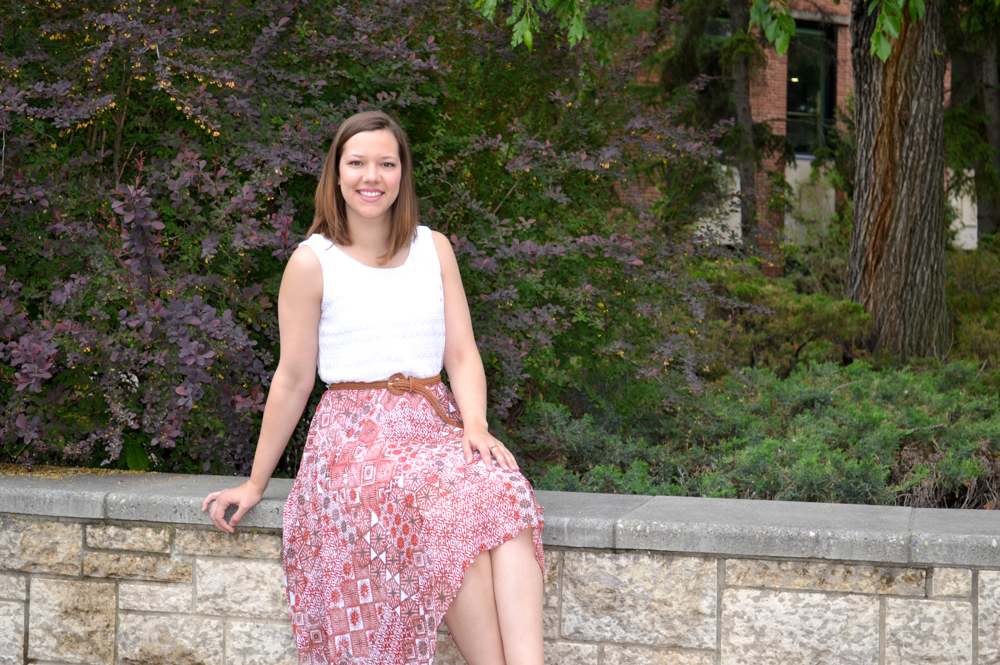
Maxine Myre is the third Vanier Award Recipient in the Faculty of Physical Education and Recreation's history
The Vanier Graduate Scholarship is one of the most prestigious awards for Canadian students to receive, which makes it one of the most competitive scholarships across the country. So when Maxine Myre received an email through her Research Net account, she really didn't know what was waiting for her inside that virtual envelope.
"I didn't know what to expect due to the competitive nature of the award," says Maxine. Much to her amazement, the news was as good as it gets. "When I opened the email, I instantly felt a mix of excitement, surprise and disbelief! I kept going back into Research Net for the next couple of days to make sure I didn't read it wrong!"
Maxine is a first year graduate student with the Faculty of Physical Education and Recreation working on her PhD under the supervision of Dr. Tanya Berry. She is also a 2016 Vanier Scholar - one of 10 UAlberta students and only the third in the history of the Faculty of Physical Education and Recreation.
Aimed to attract and retain world-class doctoral students, the Vanier Scholarship offers winners financial support to assist them during their studies in Canada. The rigorous review process is focused around three main selection criteria: academic excellence, research potential and leadership - three areas Dr. Tanya Berry felt Maxine excelled.
"I saw and continue to see strong evidence of academic excellence, research potential and leadership in Maxine's work," says Berry. "She is an excellent researcher and communicator and uses her skills to promote science. I felt that Maxine's application would be strong and I couldn't be happier for her now that she has been awarded an impressive Vanier Graduate Scholarship."
Getting her undergraduate degree in Biology from Laurentian University and a Masters in Human Kinetics from the University of Ottawa, Myre made the move to Alberta after finding an institution and supervisor that both align with her research interests would allow her to develop as an independent researcher.
"Both the Faculty of Physical Education and Recreation and Dr. Berry are the reasons why I choose the University of Alberta. The environment on campus is very supportive for graduate students, giving us plenty of opportunities to collaborate with researchers within the Faculty and institution."
"Dr. Berry is one of the leading researchers in applying dual-process theories to physical activity (specifically) and health (generally), and an excellent model for developing a successful research career."
Maxine's research looks at how individuals with obesity are portrayed in the media, the misconceptions and stereotypes related to obesity and fitness, and barriers that individuals with obesity may face when trying to engage in physical activity.
"There is a lot of shame and blame directed towards persons with obesity in today's society. The consequences of weight stigma are diverse, and can include body image issues, depression, unhealthy eating, and avoidance of physical activity. Given that the benefits of physical activity exist regardless of body size, it's important to understand how experiencing weight stigma can influence physical activity behaviours. My research will try to address these issues."
Along with being a dedicated student and researcher, Maxine has taken on several leadership roles in her short time at UAlberta. She is currently in the role of Communications Director for the Canadian Obesity Network Students and New Professionals National Executive, a not-for-profit aimed at improving the lives of Canadians affected by obesity. Working with a great team, Maxine has been able to create and manage a new blog, as well as plan several sessions for the International Congress on Obesity, which was held in Vancouver in May.
Sharing her love of science with youth, Maxine also volunteers with a national organization that aims to improve science literacy among young students called Let's Talk Science.
"I've delivered all sorts of activities about science and health to students from kindergarten to high school. There's nothing like getting out of the lab and seeing children and youth get excited about science to remember why you entered the field in the first place!"
And we can't forget to mention her volunteer role within the Faculty planning the annual graduate student conference, ReCon VI, which took place in Canmore this past September.
The financial help that Maxine will receive through the Vanier Scholarship will take some of the pressure off that so many young researchers face, and allow her to focus on building what is surely to be a very successful career.
"Being awarded a Vanier Scholarship will allow me to dedicate most of my time on my research for the remainder of my PhD. I hope that through my research and my involvement with organizations such as the Canadian Obesity Network, I can have a role in reducing the stigma associated with obesity and promote physical activity for people of all body sizes."